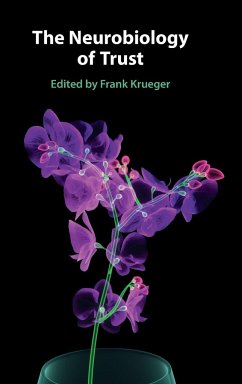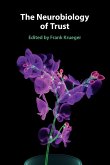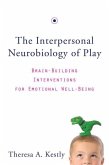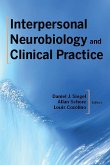The Neurobiology of Trust
Herausgeber: Krueger, Frank
The Neurobiology of Trust
Herausgeber: Krueger, Frank
- Gebundenes Buch
- Merkliste
- Auf die Merkliste
- Bewerten Bewerten
- Teilen
- Produkt teilen
- Produkterinnerung
- Produkterinnerung
This book provides a starting point for researchers, undergraduates, and graduate students looking into the interdisciplinary study of trust. It incorporates perspectives from across the social, behavioural, and neural sciences including economics, psychology, human factors, neuroscience, and psychiatry.
Andere Kunden interessierten sich auch für
![The Neurobiology of Trust The Neurobiology of Trust]() The Neurobiology of Trust46,99 €
The Neurobiology of Trust46,99 €![The Science of Sin The Science of Sin]() Jack LewisThe Science of Sin18,99 €
Jack LewisThe Science of Sin18,99 €![The Interpersonal Neurobiology of Play The Interpersonal Neurobiology of Play]() Theresa A. KestlyThe Interpersonal Neurobiology of Play38,99 €
Theresa A. KestlyThe Interpersonal Neurobiology of Play38,99 €![Healing the Fragmented Selves of Trauma Survivors Healing the Fragmented Selves of Trauma Survivors]() Janina FisherHealing the Fragmented Selves of Trauma Survivors40,99 €
Janina FisherHealing the Fragmented Selves of Trauma Survivors40,99 €![The Neurobiology of Attachment-Focused Therapy The Neurobiology of Attachment-Focused Therapy]() Jonathan BaylinThe Neurobiology of Attachment-Focused Therapy28,99 €
Jonathan BaylinThe Neurobiology of Attachment-Focused Therapy28,99 €![Healing the Fragmented Selves of Trauma Survivors Healing the Fragmented Selves of Trauma Survivors]() Janina FisherHealing the Fragmented Selves of Trauma Survivors137,99 €
Janina FisherHealing the Fragmented Selves of Trauma Survivors137,99 €![Interpersonal Neurobiology and Clinical Practice Interpersonal Neurobiology and Clinical Practice]() Siegel, Daniel J., M.D. (Mindsight Institute)Interpersonal Neurobiology and Clinical Practice35,99 €
Siegel, Daniel J., M.D. (Mindsight Institute)Interpersonal Neurobiology and Clinical Practice35,99 €-
-
-
This book provides a starting point for researchers, undergraduates, and graduate students looking into the interdisciplinary study of trust. It incorporates perspectives from across the social, behavioural, and neural sciences including economics, psychology, human factors, neuroscience, and psychiatry.
Hinweis: Dieser Artikel kann nur an eine deutsche Lieferadresse ausgeliefert werden.
Hinweis: Dieser Artikel kann nur an eine deutsche Lieferadresse ausgeliefert werden.
Produktdetails
- Produktdetails
- Verlag: Cambridge University Press
- Seitenzahl: 514
- Erscheinungstermin: 15. November 2021
- Englisch
- Abmessung: 235mm x 157mm x 32mm
- Gewicht: 872g
- ISBN-13: 9781108488563
- ISBN-10: 1108488560
- Artikelnr.: 61678593
- Herstellerkennzeichnung
- Libri GmbH
- Europaallee 1
- 36244 Bad Hersfeld
- gpsr@libri.de
- Verlag: Cambridge University Press
- Seitenzahl: 514
- Erscheinungstermin: 15. November 2021
- Englisch
- Abmessung: 235mm x 157mm x 32mm
- Gewicht: 872g
- ISBN-13: 9781108488563
- ISBN-10: 1108488560
- Artikelnr.: 61678593
- Herstellerkennzeichnung
- Libri GmbH
- Europaallee 1
- 36244 Bad Hersfeld
- gpsr@libri.de
Preface; I. Fundamental Level of Trust; 1. Trust and psychology:
Psychological theories and principles underlying interpersonal trust Jeffry
A. Simpson and Grace Vieth; 2. Trust and behavioral economics: Exploration
of trust based on game theory Devdeepta Bose and Colin Camerer; 3. Trust
and digitalization: Review of behavioral and neuroscience evidence René
Riedl; 4. Trust and human factors: Foundations of trust in automation Tracy
L. Sanders, Alexandra D. Kaplan, Keith MacArthur, William G. Volante, and
Peter A. Hancock; II. Neuropsychological Level of Trust; 5. Trust and risk:
Neuroeconomic foundations of trust based on social risk Nina
Lauharatanahirun and Jason A. Aimone; 6. Trust and emotion: The effects of
incidental and integral affect Federica Farolfi, Li-Ang Chang, and Jan B.
Engelmann; 7. Trust and reputation: How knowledge about others shapes our
decisions Emily G. Brudner, Alec J. Karousatos, Dominic S. Fareri, and
Mauricio R. Delgado; 8. Trust and learning: Neurocomputational signatures
of learning to trust Gabriele Bellucci and Jean-Claude Dreher; III.
Neurocharacteristic Level of Trust; 9. Trust and distrust: Key similarities
and differences Brian W. Haas; 10. Trust and reciprocity: The role of
outcome-based and belief-based motivations Flora Li, Pearl H. Chiu, and
Brooks King-Casas; 11. Trust and demographics: Age and gender differences
in trust and reciprocity behavior Hester Sijtsma and Lydia Krabbendam; 12.
Trust and brain dynamics: Insights from task-based and task-free
neuroimaging investigations Yan Wu and Frank Krueger; IV. Neuromolecular
Level of Trust; 13. Trust and oxytocin: Context-dependent exogenous and
endogenous modulation of trust Zhimin Yan and Peter Kirsch; 14. Trust and
psychopharmaca: Neuromodulation of the signaling pathways underlying trust
behavior Mary R. Lee, Apoorva Veerareddy, and Frank Krueger; 15. Trust and
genetics: Genetic basis of trust behavior and trust attitude Qiulu Shou,
Kuniyuki Nishina, and Haruto Takagishi; V. Neuropathological Level of
Trust; 16. Trust and psychotic disorders: Unraveling the dynamics of
paranoia and disturbed social interaction Imke L.J. Lemmers-Jansen and
Anne-Kathrin J. Fett; 17. Trust and personality disorders: Phenomenology,
determinants, and therapeutical approaches Stefanie Lis, Miriam Biermann,
and Zsolt Unoka; 18. Trust and lesion evidence: Lessons from
neuropsychology on the neuroanatomical correlates of trust Hannah E.
Wadsworth and Daniel Tranel; Index.
Psychological theories and principles underlying interpersonal trust Jeffry
A. Simpson and Grace Vieth; 2. Trust and behavioral economics: Exploration
of trust based on game theory Devdeepta Bose and Colin Camerer; 3. Trust
and digitalization: Review of behavioral and neuroscience evidence René
Riedl; 4. Trust and human factors: Foundations of trust in automation Tracy
L. Sanders, Alexandra D. Kaplan, Keith MacArthur, William G. Volante, and
Peter A. Hancock; II. Neuropsychological Level of Trust; 5. Trust and risk:
Neuroeconomic foundations of trust based on social risk Nina
Lauharatanahirun and Jason A. Aimone; 6. Trust and emotion: The effects of
incidental and integral affect Federica Farolfi, Li-Ang Chang, and Jan B.
Engelmann; 7. Trust and reputation: How knowledge about others shapes our
decisions Emily G. Brudner, Alec J. Karousatos, Dominic S. Fareri, and
Mauricio R. Delgado; 8. Trust and learning: Neurocomputational signatures
of learning to trust Gabriele Bellucci and Jean-Claude Dreher; III.
Neurocharacteristic Level of Trust; 9. Trust and distrust: Key similarities
and differences Brian W. Haas; 10. Trust and reciprocity: The role of
outcome-based and belief-based motivations Flora Li, Pearl H. Chiu, and
Brooks King-Casas; 11. Trust and demographics: Age and gender differences
in trust and reciprocity behavior Hester Sijtsma and Lydia Krabbendam; 12.
Trust and brain dynamics: Insights from task-based and task-free
neuroimaging investigations Yan Wu and Frank Krueger; IV. Neuromolecular
Level of Trust; 13. Trust and oxytocin: Context-dependent exogenous and
endogenous modulation of trust Zhimin Yan and Peter Kirsch; 14. Trust and
psychopharmaca: Neuromodulation of the signaling pathways underlying trust
behavior Mary R. Lee, Apoorva Veerareddy, and Frank Krueger; 15. Trust and
genetics: Genetic basis of trust behavior and trust attitude Qiulu Shou,
Kuniyuki Nishina, and Haruto Takagishi; V. Neuropathological Level of
Trust; 16. Trust and psychotic disorders: Unraveling the dynamics of
paranoia and disturbed social interaction Imke L.J. Lemmers-Jansen and
Anne-Kathrin J. Fett; 17. Trust and personality disorders: Phenomenology,
determinants, and therapeutical approaches Stefanie Lis, Miriam Biermann,
and Zsolt Unoka; 18. Trust and lesion evidence: Lessons from
neuropsychology on the neuroanatomical correlates of trust Hannah E.
Wadsworth and Daniel Tranel; Index.
Preface; I. Fundamental Level of Trust; 1. Trust and psychology:
Psychological theories and principles underlying interpersonal trust Jeffry
A. Simpson and Grace Vieth; 2. Trust and behavioral economics: Exploration
of trust based on game theory Devdeepta Bose and Colin Camerer; 3. Trust
and digitalization: Review of behavioral and neuroscience evidence René
Riedl; 4. Trust and human factors: Foundations of trust in automation Tracy
L. Sanders, Alexandra D. Kaplan, Keith MacArthur, William G. Volante, and
Peter A. Hancock; II. Neuropsychological Level of Trust; 5. Trust and risk:
Neuroeconomic foundations of trust based on social risk Nina
Lauharatanahirun and Jason A. Aimone; 6. Trust and emotion: The effects of
incidental and integral affect Federica Farolfi, Li-Ang Chang, and Jan B.
Engelmann; 7. Trust and reputation: How knowledge about others shapes our
decisions Emily G. Brudner, Alec J. Karousatos, Dominic S. Fareri, and
Mauricio R. Delgado; 8. Trust and learning: Neurocomputational signatures
of learning to trust Gabriele Bellucci and Jean-Claude Dreher; III.
Neurocharacteristic Level of Trust; 9. Trust and distrust: Key similarities
and differences Brian W. Haas; 10. Trust and reciprocity: The role of
outcome-based and belief-based motivations Flora Li, Pearl H. Chiu, and
Brooks King-Casas; 11. Trust and demographics: Age and gender differences
in trust and reciprocity behavior Hester Sijtsma and Lydia Krabbendam; 12.
Trust and brain dynamics: Insights from task-based and task-free
neuroimaging investigations Yan Wu and Frank Krueger; IV. Neuromolecular
Level of Trust; 13. Trust and oxytocin: Context-dependent exogenous and
endogenous modulation of trust Zhimin Yan and Peter Kirsch; 14. Trust and
psychopharmaca: Neuromodulation of the signaling pathways underlying trust
behavior Mary R. Lee, Apoorva Veerareddy, and Frank Krueger; 15. Trust and
genetics: Genetic basis of trust behavior and trust attitude Qiulu Shou,
Kuniyuki Nishina, and Haruto Takagishi; V. Neuropathological Level of
Trust; 16. Trust and psychotic disorders: Unraveling the dynamics of
paranoia and disturbed social interaction Imke L.J. Lemmers-Jansen and
Anne-Kathrin J. Fett; 17. Trust and personality disorders: Phenomenology,
determinants, and therapeutical approaches Stefanie Lis, Miriam Biermann,
and Zsolt Unoka; 18. Trust and lesion evidence: Lessons from
neuropsychology on the neuroanatomical correlates of trust Hannah E.
Wadsworth and Daniel Tranel; Index.
Psychological theories and principles underlying interpersonal trust Jeffry
A. Simpson and Grace Vieth; 2. Trust and behavioral economics: Exploration
of trust based on game theory Devdeepta Bose and Colin Camerer; 3. Trust
and digitalization: Review of behavioral and neuroscience evidence René
Riedl; 4. Trust and human factors: Foundations of trust in automation Tracy
L. Sanders, Alexandra D. Kaplan, Keith MacArthur, William G. Volante, and
Peter A. Hancock; II. Neuropsychological Level of Trust; 5. Trust and risk:
Neuroeconomic foundations of trust based on social risk Nina
Lauharatanahirun and Jason A. Aimone; 6. Trust and emotion: The effects of
incidental and integral affect Federica Farolfi, Li-Ang Chang, and Jan B.
Engelmann; 7. Trust and reputation: How knowledge about others shapes our
decisions Emily G. Brudner, Alec J. Karousatos, Dominic S. Fareri, and
Mauricio R. Delgado; 8. Trust and learning: Neurocomputational signatures
of learning to trust Gabriele Bellucci and Jean-Claude Dreher; III.
Neurocharacteristic Level of Trust; 9. Trust and distrust: Key similarities
and differences Brian W. Haas; 10. Trust and reciprocity: The role of
outcome-based and belief-based motivations Flora Li, Pearl H. Chiu, and
Brooks King-Casas; 11. Trust and demographics: Age and gender differences
in trust and reciprocity behavior Hester Sijtsma and Lydia Krabbendam; 12.
Trust and brain dynamics: Insights from task-based and task-free
neuroimaging investigations Yan Wu and Frank Krueger; IV. Neuromolecular
Level of Trust; 13. Trust and oxytocin: Context-dependent exogenous and
endogenous modulation of trust Zhimin Yan and Peter Kirsch; 14. Trust and
psychopharmaca: Neuromodulation of the signaling pathways underlying trust
behavior Mary R. Lee, Apoorva Veerareddy, and Frank Krueger; 15. Trust and
genetics: Genetic basis of trust behavior and trust attitude Qiulu Shou,
Kuniyuki Nishina, and Haruto Takagishi; V. Neuropathological Level of
Trust; 16. Trust and psychotic disorders: Unraveling the dynamics of
paranoia and disturbed social interaction Imke L.J. Lemmers-Jansen and
Anne-Kathrin J. Fett; 17. Trust and personality disorders: Phenomenology,
determinants, and therapeutical approaches Stefanie Lis, Miriam Biermann,
and Zsolt Unoka; 18. Trust and lesion evidence: Lessons from
neuropsychology on the neuroanatomical correlates of trust Hannah E.
Wadsworth and Daniel Tranel; Index.









